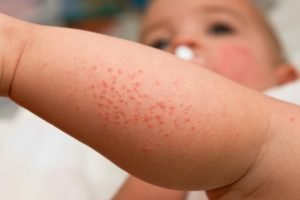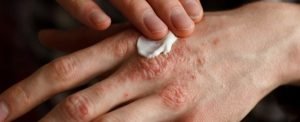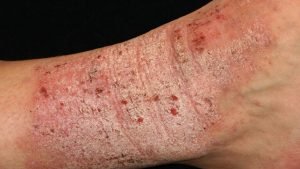Eczema Treatment in Delhi
Eczema is a term for several different types of skin swelling and disorder. It is common in children but can occur at any age. Atopic dermatitis is long-lasting (chronic) and tends to flare periodically.
The word Eczema is also used specifically to talk about atopic dermatitis, this is the most common type of eczema. Eczema symptoms include itchy, red, and dry skin caused by inflammation.
It is most common in babies and children but adults can have it too, as we said that it may occur at any age. Eczema is sometimes called atopic dermatitis, which is the most common form of eczema.
Atopic refers to an allergy or an allergic skin disorder. People with eczema often have allergies or asthma along with itchy, red skin.
One of the signs of atopic dermatitis is over the top skin dryness,
which is by all accounts due to an absence of certain skin proteins called as filaggrin.
A dermatitis is a group of skin conditions that include atopic dermatitis, allergic contact
dermatitis, irritant contact dermatitis, and stasis dermatitis, these are the types of eczema.
Some people always show signs of the disease. Many people raise money to fund research for cures for skin disease and skin cancer, but research does not fund itself.
When you have eczema, it means your immune system is working too hard. Eczema can be a very stressful and frustrating skin condition and can make living your daily life challenging and uncomfortable.
As kids get older, the rash is usually scarier than it was when eczema first began, and the skin is extremely itchy and dry with the time.
WHAT IS ECZEMA:
The word “Eczema” is also used specifically to talk about atopic dermatitis, the most common type of eczema.
“Atopic” refers to a collection of diseases involving the immune system, including atopic dermatitis, asthma, and hay fever. Dermatitis is an inflammation of the skin which may occur any part of the body.
Some people outgrow the condition in childhood, while others will continue to have it throughout adulthood.
Eczema is a common skin condition that affects over 30 million and above people in the world. In general, eczema can affect the skin by causing:
- Dark colored patches
- Rough, scaly, or leathery patches
- Swelling
- Crusting and oozing
Eczema is not contagious, which means that a person cannot catch it or pass it onto another person.
In this article, we look at different types of eczema, their symptoms, and what causes them and their treatment. We also cover diagnosis, best treatment, and how to prevent flare-ups.
SYMPTOMS:
Atopic dermatitis commonly occurs in infants, with dry and scaly patches appearing on the skin. These patches are often intensely itchy and dry.
Most people develop atopic dermatitis before the age of 5 years. Half of those who develop the condition in childhood continue to have symptoms as an adult, this skin condition is irritating.
However, these symptoms are so different from those experienced by children.
People with the skin condition will often experience periods of time where their symptoms flare up or worsen, followed by periods of time where their symptoms will improve or clear up.
Symptoms in infants under 2 years old:
- Rashes commonly appear on the scalp and cheeks and hands.
- Rashes usually bubble up before leaking the fluid.
- Rashes can cause extreme itchiness and dryness. This may interfere with sleeping. Continuous rubbing and scratching can lead to skin infections.
Symptoms in children aged 2 years until puberty:
- Rashes commonly appear behind the creases of head, elbows or knees.
- They are also common on the neck, wrists, ankles, and the crease between buttock and legs.
 Over time, the following symptoms can occur:
Over time, the following symptoms can occur:
- Rashes can become bumpy and fluidized.
- Rashes can lighten or darken in the color.
- Rashes can thicken in a procedure known as lichenification. The rashes can then develop knots and a permanent itch.
Symptoms in adults:
- Rashes commonly appear increases of the elbows or knees or the nape of the neck.
- Rashes cover much of the body.
- Rashes can be especially prominent on the neck, face, and around the eyes.
- Rashes can cause very dry skin.
- Rashes can be permanently itchy and dry.
- Rashes in adults can be more scaly than those occurring in children or infants.
- Rashes can lead to skin infections and disorder.
Adults who developed atopic dermatitis as a child but no longer experience the condition may still have dry or easily irritated skin, hand eczema, and eye problems.
The appearance/look of skin affected by atopic dermatitis will depend on how much a person scratches and whether the skin is infected.
Scratching and rubbing further irritate the skin, increase inflammation, and make itchiness worse and worse.
CAUSES:
The specific cause of eczema remains unknown, but it is believed to develop due to a combination of Genetic and Environmental factors.
Eczema is not contagious, as above.
Children are more likely to develop eczema if a parent has had the condition or other atopic diseases.
If both parents have an atopic disease, the risk is even greater, because of genetics.
Environmental factors are also known to bring out the symptoms of eczema, such as:
Irritants: These include soaps, detergents, shampoos, conditioners, disinfectants, juices from fresh fruits, meats, or vegetables.
Allergens: Dust mites, pets, pollens, mold, and dandruff can lead to eczema or psoriases.
Microbes: These include bacteria such as Staphylococcus aureus, viruses, and certain fungi.
Hot and cold temperatures: Very hot or cold weather, high and low humidity, and perspiration from exercise can bring out eczema and other skin conditions.
Foods: Dairy products like eggs, nuts and seeds, soy products, and wheat can cause eczema flare-ups.
Stress: This is not a direct cause of eczema but can make symptoms worse.
Hormones: Women can experience increased eczema symptoms at times when their hormone levels are changing with the time, for example during pregnancy and at certain points in the menstrual cycle.
TYPES:
There are many different types of eczema. While this article has focused mainly on atopic dermatitis, other types may include:
Atopic Eczema is more common in children, often developing before their first birthday. However, it may also develop for the first time in adults.
With atopic dermatitis, even when your skin looks clear, the inflammation may still be active under the surface, and your next flare-up is just waiting to return.
Allergic contact dermatitis:
This is a skin reaction and condition that following contact with a substance or allergen that the immune system recognizes as foreign.
Dyshidrotic eczema:
This is an irritation of the skin on the palms of the hands and the soles of the feet. It is characterized by blisters and scarring.
Neurodermatitis:
This forms scaly patches of skin on the head or scalp, forearms, wrists, and lower legs. It is caused by a localized itch, such as an insect bite.
Nummular eczema:
This type of eczema symptoms includes as circular patches of irritated skin that can be crusted, scaly, and itchy.
Seborrheic eczema:
This forms oily, scaly, yellowish patches of the skin, usually on the scalp and face.
Stasis dermatitis:
This is a skin irritation or dermatitis of the lower leg usually related to circulatory problems.
WHEN TO SEE A DOCTOR:
People who experience these symptoms of eczema should see a doctor or dermatologist. Eczema can indicate a new allergy, so it is important to determine what is causing the reaction.
Eczema can also increase the likelihood of staph infections and have a severe effect on a person’s mental health and can cause emotional trauma. A doctor can recommend a treatment plan to manage symptoms and flare-ups.
There is no specific test to diagnose most types of eczema. The Dermatologist in Delhi will want to know the individual’s personal and family medical history.
They will also ask about recent exposures to potential allergens and irritants. It is essential that people let the dermatologist know if they have hay fever or asthma.
The doctor may also ask about:
- Sleep patterns
- Stress factors
- Any previous treatments for skin conditions
- Any use of steroids
A physical examination of the rash will help the doctor to diagnose which type of eczema it is.
The dermatologist may also perform a patch test, which involves pricking a person’s skin with a needle that contains potential irritants and allergens.
A patch test can determine whether or not someone has contact dermatitis.
 LASER THERAPY FOR ECZEMA TREATMENT:
LASER THERAPY FOR ECZEMA TREATMENT:
Today, there is another option for treating Eczema is excimer lasers, which deliver ultraviolet light to localized areas of the skin.
This treatment uses intense, focused doses of laser light to help control areas of mild to moderate eczema without harming healthy skin around them.
Targeted laser therapy is similar in effectiveness to traditional light therapy, but it works in fewer sessions with stronger doses of light that can reach deeper into the affected skin and skin layer.
The handheld laser wands are also good for reaching eczema in hard-to-treat areas, such as the elbows, knees, palms of the hands, soles of the feet, and scalp.
Eczema Laser Treatment: How It Works
Excimer laser treatments are performed in the dermatologist’s office in Delhi. Each session takes only a few minutes.
During the treatment, the doctor aims the laser directly at patches of psoriasis/eczema. You might feel some warmth at the site or a snapping sensation against the skin.
Excimer lasers aim a high-intensity ultraviolet B (UVB) light dose of a very specific wavelength — 308 nanometers — directly at the psoriasis plaques.
Because the laser light never touches the surrounding skin, it reduces the risk of UV radiation exposure. Excimer lasers are used to treat a mild-to-moderate skin condition.
With excimer laser therapy, patients usually have 2 sessions a week for 4 to 10 sessions to get the best results.
What You Should Know Before Starting Laser Treatment:
Laser treatment for psoriasis can produce dramatic results in some people but this therapy is not for everyone.
To make sure you are a good candidate, have a complete health history and exam done before starting the treatment.
Avoid laser treatments if you have:
- Lupus or scleroderma
- Sun sensitivity
- Xeroderma pigmentosum (an inherited disease that causes sensitivity to sunlight)
- Risks for, or a history of, skin cancer
- A condition that requires you to take medications that make you sensitive to the sun
Are There Any Risks to Laser Treatments for Eczema?
Laser therapy is generally safe, but some people have reported side effects after treatment, including:
Darkening or lightening of the skin i.e. hyperpigmentation or hypopigmentation.
Scarring.
More research is needed to determine whether exposure to UVB light from the excimer laser might increase the long-term risk for skin cancer or not.
TREATING ECZEMA WITH PHOTOTHERAPY:
Phototherapy treatment involves the use of UV light to halt or lessen the overreaction of your immune system.
This treatment for eczema is effective and best, but may prematurely age the skin and raise your risk for developing skin cancer along the line, so precautions must be taken.
There are two kinds of phototherapy which are: UV therapy and PUVA therapy. With UV therapy, your skin is exposed to UVA and UVB rays, sometimes singly, sometimes together, and occasionally with coal tar rubbed on your skin.
PUVA therapy adds psoralen, A prescription drug that will make your skin more sensitive to UVA rays. This treatment is used when UV therapy has not been successful.
Broadband UVB phototherapy:
UVB stands for type B ultraviolet light, which has been used to treat skin conditions since the 1920s and yet.
Eczema treatment involves standing in a lightbox three times per week for a total course of 20 to 30 sessions.
The length of each treatment/procedure increases until the skin becomes slightly pink. After the first phase of treatment, weekly maintenance treatments may be given.
UVA phototherapy:
UVA stands for the type A ultraviolet light. UVA is also present in sunlight but acts differently on the skin than UVB.
In order for UVA eczema light therapy to be effective, An oral medication, psoralen, must be taken an hour prior to the treatment to make the skin more sensitive to light therapy.
This combination of psoralen and UVA is called PUVA phototherapy. PUVA eczema treatments are given two to three times per week for 12 to 15 weeks.
As with UVB, the length of exposure is increased gradually, and weekly maintenance treatments may be given after the first phase of the treatment.
Some people are unable to tolerate PUVA because of nausea from psoralen.
Narrowband UVB phototherapy:
Narrowband UVB is gradually replacing both broadband UVB and PUVA. It is as effective and one of the best treatment for the skin disorder as other types of eczema phototherapy and has fewer side effects because you don’t need to take a pill.
Narrowband UVB uses a very small part of the UVB spectrum, which cuts down on exposure to UV radiation.
Because eczema treatments can be given more safely and efficiently, narrowband UVB may be more effective and require a shorter course of treatment.
The advantages of using eczema light therapy are that these therapies often work when other eczema treatments have not, and if done properly they actually have fewer side effects than many of the prescription medications used for eczema.
- Dehydration due to jaundice.
- Unstable temperature under the lights.
- Skin irritation if using biliblankets.
 PREVENTION:
PREVENTION:
When you keep your skin healthy, you can prevent dryness, itching, redness, and maybe lessen the need for medication. Plus, but you can prevent it can’t eliminate it permanently. Try these tips:
Bathe only in warm water:
Hot water dries out skin, so don’t use warm water. Wash with a gentle cleanser instead of soap.
Don’t use body scrubbers or washcloths, which can be irritating. Pat dry with a soft towel instead of rubbing, and be sure to leave your skin damp and dry.
Apply moisturizers daily:
Do it right after you bathe or wash your hands, chose your moisturizer which is prescribed by your doctor. Choose fragrance-free moisturizers that won’t irritate you.
Try using a thicker skin cream or ointment that has more oil at night, and wear cotton gloves or socks to lock in moisture. Gloves can also keep you from scratching in your sleep.
Avoid too much bathing and hand washing:
It will dry out your skin and steer clear of alcohol-based hand cleaners, too.
Limit your contact with skin irritants:
Household cleaners, laundry detergents, perfumed soaps, bubble baths, cosmetics, and many other things can make eczema worse so learn what irritates your skin so you can avoid it.
Choose cotton clothes that fit comfortably:
Wool and synthetic fibers can be irritating for ease to choose cotton clothes. Also, be sure to wash new clothes before you wear them for the first time. Use fragrance-free laundry soap, and rinse your laundry thoroughly.
Avoid getting overheated:
When you are hot and sweaty, it can trigger itching and scratching. After a workout, rinse off right away in a warm shower.
Know your triggers:
Many people with eczema react to allergens such as pollen, dust mites, animal dander, and mold, beware of these.
Ease stress:
It can be hard but not impossible to find time to relax, but lowering your stress level will help you avoid symptom flare-ups.
WHY ADORABLE CLINIC FOR ECZEMA:
If you are looking for Eczema treatment then Adorable Clinic is the right choice.
At an Adorable Clinic, our team of expert skin specialist in Delhi examines your problems and prescribes the right method to make you best looking.
Adorable Clinic provides many types of treatments to help prevent Eczema, Psoriasis, Dermatitis, and another skin disorder, which helps to get a fuller head one of the best techniques is Hair Weaving.
Eczema treatment cost varies from person to person as the skin type and the type of treatment given to the person vary.
Contact us on 097111 50928 to make an appointment, the first consultation fee will be free. Visit us at 30/192, Vikram Vihar, Lajpat Nagar IV, New Delhi, Delhi 110024 or mail us your query our team is always ready to assist you with your issues.
As we have 10 Years of Experiences satisfied thousand (10,000) of Customer with our latest and advanced technology, That is why the Adorable clinic is best for the Eczema treatment.

 WhatsApp us
WhatsApp us